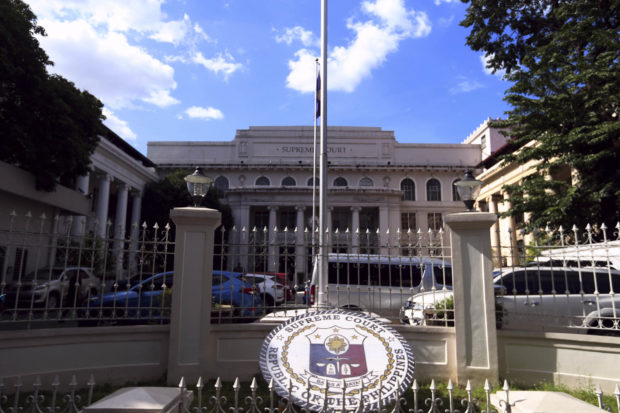
BASTION OF RIGHTS The Supreme Court building in Ermita, Manila. INQUIRER file photo / EDWIN BACASMAS
MANILA, Philippines — Advocacy group Bayan and a group of Sangguniang Kabatan urged the Supreme Court to push through with the oral argument on the petitions questioning the legality of the Anti-Terrorism Act of 2020.
In a Joint Opposition filed Monday through the National Union of Peoples’ Lawyers, petitioners said canceling the oral arguments will be a disservice to public interest in the petitions.
To date, there are already a total of 32 petitions against the Anti-Terror Law, by far the highly contentious case currently pending before the Supreme Court. The petitions were filed by various sectors from educators, youth, human-rights groups 1987 Constitution framers, retired magistrates, among others.
“The unprecedented number of petitions filed to invalidate RA 11479–at least 32 as of this writing–only indicates the transcendental importance of these cases,” read the joint opposition.
“Petitioners and their co-petitioners have amply argued that the assailed law is a comprehensive and draconian law that abridges the people’s basic freedoms and upsets the balance of powers in our republican and democratic system of government,” they further stated.
They added that: “No one, save its proponents, is safe from the assailed law. Thus, the issues surrounding its validity are matters of public concern of which the public has the right to be informed.”
Petitioners added that the Office of the Solicitor-General cannot also use the pandemic to do away with the oral argument because the Supreme Court itself has adjusted well with the “new normal.”
“Respondents, therefore, cannot now undermine the ability of the Honorable Court to conduct oral arguments in a way that balances the overriding public interest in these cases and the safety of the parties, their counsels, and the Court’s members and staff,” they added.
Petitioners pointed out that if courts in remote areas have been successfully conducting hearings online, “there is no reason why the same cannot be done in Manila.”
“Interestingly, for the proponents of a law that has been so ‘unfairly stigmatized,’ respondents are averse to throwing light on the same through the oral arguments. It seems that by refusing to be subjected under public scrutiny, respondents intend to obscure the law, which operates in the shadows,” the petitioners added.

